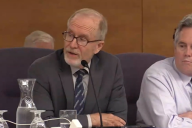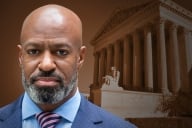You have /5 articles left.
Sign up for a free account or log in.
The professor had agreed to write a letter of recommendation for a student's application to graduate school. It was a standard request from a good student, the kind of request the professor receives every semester.
Then the recommendation form arrived. And something seemed off.
There was a question about the student's "physical condition," with these possible answers:
- Frequently incapacitated
- Somewhat below par
- Fairly healthy
- Good health
- Don't know
The professor -- who asked not be identified to avoid hurting the chances of admission for his student -- said the question made no sense.
"I feel that some of the questions are completely out of bounds, because they are inherently discriminatory," he said via email. "Perhaps the most obvious are the first set of questions about 'physical condition.' As someone who works in the academic side of religious studies, I know well many religious leaders. Some of these friends and acquaintances are physically disabled (differently abled). Some have quite severe physical differences. Yet they are also some of the most gifted ministers, rabbis, dharma teachers (or other type of religious leader) I know. Physical condition is no predictor of capacity to perform as a minister."
The professor also objected to other questions from Dallas Theological Seminary, which offers instruction on campuses in Dallas, Houston, San Antonio and Austin in Texas, and also has campuses in Atlanta, Indianapolis, Phoenix and Washington. It offers 16 degrees, including master's degrees in theology, Biblical counseling, chaplaincy, Christian education and Christian leadership, and a Ph.D. and other doctoral degrees. (Not all of the programs are offered on every campus.)
For instance, in the question about "intelligence," the lowest rating is “learns and thinks slowly.” But the professor noted that "deep learning does not happen quickly. In the humanities, we value slow, deliberate thinking, and recognize that the most profound and lasting learning takes time. In fact, the best learning is the life-long kind of learning."
Or consider the question asking for an evaluation on the applicant's "teachability."
- Rigid, argumentative
- Highly opinionated
- Open-minded
- Willing to receive instruction
- Eager to receive instruction
- Don't know
"Highly opinionated also seems to be a negative trait they are looking to exclude," the professor said. "I prefer students who have strong opinions but are open to hearing the opinions of others and to reconsidering their own."
Other questions also disturbed him.
There is a question on sexuality and whether the applicants adhere to the policies of Dallas Theological and "includes avoiding any pattern of addiction and abstaining from homosexual, premarital, and extramarital sexual conduct."
And, if the applicant is married or engaged, the recommendation letter asks for an analysis of the relationship as: "superficial," "detached, aloof," "reserved," "warm, growing" and "good communication."
On the seminary's website, under "how we evaluate," it says, "As an applicant, you will be evaluated on the basis of (1) your academic records, (2) the extent and quality of involvement in Christian service, (3) your apparent gifts and potential for placement into Christian ministry, and (4) the assessment of your references."
Are the Questions Legal?
The first question many may have is about the legality of asking such questions.
John Dyer, dean of enrollment services and distance education at Dallas Theological, said, "I reached out to our admissions director about the questions we ask, and he mentioned that they are generally designed to prompt a reviewer to give a holistic portrait of our applicants. Unlike a traditional graduate school that is primarily evaluating a candidate’s academic merit and the ability to study, as a seminary, DTS is also attempting to get a sense of an applicant’s future in a ministry setting, such as being a pastor, chaplain, or licensed therapist. For each candidate, we ask for three references -- personal, pastoral and professional -- so some questions are more applicable to each reference type."
He said a spokesman would answer questions about whether it is legal for the seminary to ask those questions, and other questions, but no spokesman ever did.
Frank M. Yamada is executive director of the Association of Theological Schools, of which the Dallas school is a member.
He said the questions Dallas asks "aren't standard" and that it was important for any admissions office asking them to have a clear sense of why it was asking those questions.
A guide published by the association on "Disability and Theological Education" says of admissions, "Schools retain the freedom to make reasonable judgments about students’ appropriate potential for ministry, including spiritual maturity, moral integrity, and ministerial capacity. Qualified students with disabilities should have potential access to theological education and should be recruited with the same care and enthusiasm as other students. Students with disabilities should apply for admission under the same guidelines and careful screening as other students to determine whether they have the gifts and readiness for life and learning in a theological community and for future religious leadership."
The seminary's nondiscrimination policy does not mention disability status. It states, "Dallas Theological Seminary admits students of any race, color, national and ethnic origin to all the rights, privileges, programs, and activities generally accorded or made available to students at the school. It does not discriminate on the basis of race, color, national and ethnic origin in administration of its educational policies, admissions policies, scholarship and loan programs, and athletic and other school-administered program."
Disability is mentioned in the seminary's statement on Title IX of the Education Amendments of 1972: "Within the context of its theological convictions and mission, Dallas Theological Seminary (DTS) does not discriminate on the basis of race, color, sex, age, national and ethnic origin, or disability."
Section 504
Section 504 of the Rehabilitation Act bans colleges from discriminating against applicants on the basis of disability. Specifically, it says colleges "may not make pre-admission inquiry as to whether an applicant for admission is a handicapped person but, after admission, may make inquiries on a confidential basis as to handicaps that may require accommodation."
But Stephan J. Smith, executive director of the Association on Higher Education and Disability, said that if the seminary doesn't receive any federal funds, it would be exempt from Section 504 and could ask the question about physical health. The seminary did receive federal funds under the COVID-19 relief bill the CARES Act.
Asked if the seminary should ask the question, Smith said, "I don’t have a perfect answer to your question."
He explained, "I believe that qualified students should not be subject to discrimination based on speculation, stereotypes and generalizations about individuals with disabilities. That said, I recognize some specific institutions may not be covered by the requirements set forth in the law."
Angel B. Pérez, CEO of the National Association for College Admission Counseling, said, "The way I think about this is: if you wouldn’t ask a question on an employer application or interview, you probably shouldn’t ask it for collegiate enrollment."
What Did the Professor Do?
The professor still had to figure out what to do.
"I asked an admissions counselor at DTS whether I could submit a letter evaluating the student’s academic qualities in lieu of the recommendation form. I was told that I could submit a letter, but they hoped the letter would answer as many of the questions on the form as I could. I took that to mean that DTS wanted me to essentially provide the same information requested on the form by means of a letter," he said.
"After speaking with the student about my dilemma, and with the student’s approval, I decided to write a normal, academic reference letter (which I have not yet written), which speaks to the student’s academic performance in the courses she has taken with me," he said. "I will essentially ignore most of the questions or types of information they request on the standard form."








